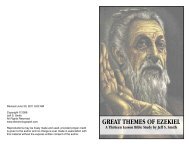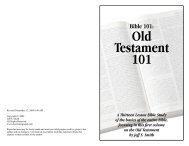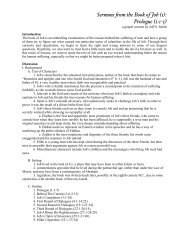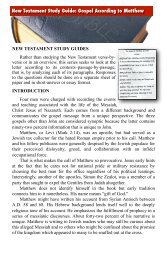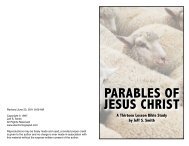or friendship at all (First John 3:10-19)b. “If you lend to those from whom you expect to receive, what credit is that to you? Evensinners lend to sinners, to get back the same amount. But love your enemies, and do good, and lend,expecting nothing in return, and your reward will be great, and you will be sons of the Most High, for heis kind to the ungrateful and the evil. Be merciful, even as your Father is merciful” (Luke 6:34-36).B. Loyalty1. Ittai is also remarkable for the loyalty of his friendship, tested by the risk of his life in additionto his fortune2. he possessed the kind of self-denying loyalty that Paul hoped to find in Timothy as he wrotehim in great infamy and distress (Second Timothy 1:8-12)3. it is a work of disloyalty when we are ashamed of the gospel or those who declare it becausethey do not measure up to our carnal standards or pride–because they are poor or uneducated orinexperienced; “Do not be haughty, but associate with the lowly. Never be conceited” (Romans 12:16).4. the truth is that genuine disciples are not often found among the societal elites (FirstCorinthians 1:26-31)5. loyalty is often tested just as friendship was–by the price tag attached to it (Luke 16:9-15)C. Courage1. Ittai was a courageous man, who was rewarded with the greater opportunities because herefused to be talked into cowardice2. like him, we need the courage instilled in us by our teachers and experiences and faith to useour gifts and opportunities to seek greater service (Second Timothy 1:3-7)3. the self-preservation impulse within us will sometimes argue against standing up and speakingout, but the Spirit reminds us that, “as for the cowardly, the faithless, the detestable … their portion willbe in the lake that burns with fire and sulfur, which is the second death” (Revelation 21:8)ConclusionIttai is a great, if obscure, example of courage and loyalty, the kind that Jesus showed to us and which weare now privileged to return.220
<strong>Character</strong> Study of the Herodsa character study by Jeff S. SmithIntroductionThe Herods are a familiar and villainous family to New Testament readers, although that name itselfactually indicates heroism. The Herods were a political family whose history of greatness wasovershadowed by its penchant for cunning, immorality and trickery.DiscussionI. Their <strong>Character</strong>A. History1. Herod is not a proper name, but a family and political name and thus many Herods cross theNew Testament stage before they are effectively extinguished along with Judaism at the hands of theRomans in A.D. 702. the Herodians were not Jewish by blood, although their patriarch, Herod the Great, encouragedthat myth in order to gain the favor of the people he came to rulea. they were Idumeans, nominal Jews in that they were subdued by John Hyrcanus in 125B.C. and compelled to adopt circumcision as a result, but still antagonistic toward the Hebrew peopleb. Antipas was the forefather of the Herods, a governor of Idumea, whose son, Antipater, wasappointed to govern Judea in 47 B.C.3. when Antipater died, his second son, who became known as Herod the Great, began his ascenta. Herod the Great began his political career as the governor of Galilee before beingpromoted to tetrach of Judea and finally its king through gaining the favor of Caesar in 37 B.C.b. Herod slaughtered his rivals, even killing his own wife, mother-in-law and sons, and sawhis kingdom expand by devouring the Arabiansc. Herod the Great “continually offended and defied his Jewish subjects, by the introductionof Roman sports and heathen temples in his dominion. His influence on the younger Jews in this regardwas baneful, and slowly a distinct partly arose, partly political, partly religious, which called itself theHerodian party, Jews in outward religious forms but Gentiles in their dress and in their whole view of life.They were a bitter offense to the rest of the nation, but were associated with the Pharisees and Sadduceesin their opposition to Christ (Matthew 22:16; Mark 3:6; 12:13).” 584. Herod tried to win the admiration of his Jewish subjects by charity and appeasement, but theycontinued to view him as a usurper of David’s throne, whose grave he robbed of its treasures to enrich hisRoman overlordsa. this he tried to balance by reconstructing the temple of Zerubbabel and making it moremagnificent than even Solomon's temple had been, a project that was mostly completed a decade or twobefore the time of Jesus, but which remained under renovation almost until it fellb. “It was so transcendently beautiful that it ranked among the world's wonders, and Josephusdoes not tire of describing its glories (BJ, V, v). Even Titus sought to spare the building in the final attackon the city (BJ, VI, iv, 3).” 595. Herod had one more rival that he wanted to kill before his own death brought about thedivision of his kingdom among his survivors (Matthew 2:1-8, 12, 16-18)B. Archelaus and Antipas1. the death of the Herod the Great is noted in Matthew 2:19, the occasion upon which Jesus’sparents return him from Egypt, but the danger has not completely subsided (Matthew 2:22-23)a. this is Herod Archelaus, the eldest son and a man of violent temperb. his rule was canceled by a rare alliance of the Jews and Samaritans who obtained relieffrom Rome, which banished Archelaus to Vienna2. Herod Antipas was his brother and ruled as tetrarch of Galilee and Perea from 4 B.C. to A.D.39a. Jesus described him as “cunning like a fox” (Luke 13:32), but this was not quite acompliment, for Antipas was as immoral, violent and selfish as anyone else who wore the nameb. he was somewhat partial to John the baptizer, but the fact that he had married his ownsister-in-law and lusted for her daughter, who was, of course, also his own stepdaughter and niece,brought him under further condemnation (Matthew 14:1-12)221
- Page 1:
CharacterStudiesby Jeff S. Smith
- Page 5:
Character StudiesThe goal of these
- Page 8 and 9:
2. she points backward to his defea
- Page 10 and 11:
2. Jesus knew he was not an oversiz
- Page 12 and 13:
6! Jeff S. Smith
- Page 14 and 15:
2. when the local church is involve
- Page 16 and 17:
10! Jeff S. Smith
- Page 18 and 19:
D. No Luther1. it fell to the apost
- Page 20 and 21:
14! Jeff S. Smith
- Page 22 and 23:
c. is the antithesis of Diotrephes
- Page 24 and 25:
2. and then he rebukes him for his
- Page 26 and 27:
20! Jeff S. Smith
- Page 28 and 29:
2. before gaining his victory over
- Page 30 and 31:
II. Practical ApplicationA. A Lesso
- Page 32 and 33:
a. we are all bending over so easil
- Page 34 and 35:
ConclusionJoseph was faithful to Go
- Page 36 and 37:
a. that, I think, is the great maje
- Page 38 and 39:
a. he had to leave his home, where
- Page 40 and 41:
34! Jeff S. Smith
- Page 42 and 43:
3. when Isaac became old and blind,
- Page 44 and 45:
II. Man’s New BeginningA. The Old
- Page 46 and 47:
1. every time the gospel is preache
- Page 48 and 49:
4. Elijah now has his turn, once th
- Page 50 and 51:
44! Jeff S. Smith
- Page 52 and 53:
a. we, like they, are strangers and
- Page 54 and 55:
D. Deliverer Appointed1. when God s
- Page 56 and 57:
50! Jeff S. Smith
- Page 58 and 59:
. those with little would be moved
- Page 60 and 61:
. in one fell swoop, he takes out a
- Page 62 and 63:
56! Jeff S. Smith
- Page 64 and 65:
3. it is not that some earn God's f
- Page 66 and 67:
60! Jeff S. Smith
- Page 68 and 69:
C. The Pleasures of Sin Are Passing
- Page 70 and 71:
64! Jeff S. Smith
- Page 72 and 73:
3. reaching our land of milk and ho
- Page 74 and 75:
68! Jeff S. Smith
- Page 76 and 77:
1. he believed, but he was not yet
- Page 78 and 79:
72! Jeff S. Smith
- Page 80 and 81:
1. we must know the Bible and be ab
- Page 82 and 83:
76! Jeff S. Smith
- Page 84 and 85:
2. David took care to respect the p
- Page 86 and 87:
a. if he complains about having to
- Page 88 and 89:
. later in life, we see Herod Antip
- Page 90 and 91:
84! Jeff S. Smith
- Page 92 and 93:
2. this Aaronic priesthood executed
- Page 94 and 95:
88! Jeff S. Smith
- Page 96 and 97:
4. that more acute, more spiritual,
- Page 98 and 99:
D. His Defense (cf. Acts 7:1-50)1.
- Page 100 and 101:
94! Jeff S. Smith
- Page 102 and 103:
A. Concern For Others, Even Servant
- Page 104 and 105:
98! Jeff S. Smith
- Page 106 and 107:
II. Some ApplicationsA. Their Chara
- Page 108 and 109:
102! Jeff S. Smith
- Page 110 and 111:
8. afterward, Pilate permitted Jose
- Page 112 and 113:
106! Jeff S. Smith
- Page 114 and 115:
D. A Student1. the eunuch is in fac
- Page 116 and 117:
110! Jeff S. Smith
- Page 118 and 119:
a. it was no more a blessing to dwe
- Page 120 and 121:
114! Jeff S. Smith
- Page 122 and 123:
D. His Palace1. Nebuchadnezzar’s
- Page 124 and 125:
118! Jeff S. Smith
- Page 126 and 127:
language, creating different tongue
- Page 128 and 129:
122! Jeff S. Smith
- Page 130 and 131:
4. Naomi returns in deep bitterness
- Page 132 and 133:
126! Jeff S. Smith
- Page 134 and 135:
. it is not hard to imagine that th
- Page 136 and 137:
130! Jeff S. Smith
- Page 138 and 139:
C. Pointing at The Antichrist1. a f
- Page 140 and 141:
134! Jeff S. Smith
- Page 142 and 143:
Sufficient cause for the unpopulari
- Page 144 and 145:
138! Jeff S. Smith
- Page 146 and 147:
2. and so the wisdom of the magi wa
- Page 148 and 149:
142! Jeff S. Smith
- Page 150 and 151:
courier it to Paul and it became to
- Page 152 and 153:
146! Jeff S. Smith
- Page 154 and 155:
illions of souls from benefiting is
- Page 156 and 157:
150! Jeff S. Smith
- Page 158 and 159:
17:15-21)2. the birth was announced
- Page 160 and 161:
154! Jeff S. Smith
- Page 162 and 163:
. Thomas insisted that he would onl
- Page 164 and 165:
158! Jeff S. Smith
- Page 166 and 167:
2. first, he becomes the epitome of
- Page 168 and 169:
162! Jeff S. Smith
- Page 170 and 171:
esteem, wondering what we will do w
- Page 172 and 173:
166! Jeff S. Smith
- Page 174 and 175:
its soothing aroma and pain-relievi
- Page 176 and 177: 170! Jeff S. Smith
- Page 178 and 179: 3. this is the last that we hear of
- Page 180 and 181: 174! Jeff S. Smith
- Page 182 and 183: and both began to return once he wa
- Page 184 and 185: 178! Jeff S. Smith
- Page 186 and 187: led to the execution of innocent Na
- Page 188 and 189: 182! Jeff S. Smith
- Page 190 and 191: government or of an occupying power
- Page 192 and 193: 186
- Page 194 and 195: to cooperate with her scheme; how c
- Page 196 and 197: 190
- Page 198 and 199: 1. literal slavery like the kind th
- Page 200 and 201: 3. when Lot chose to live in Sodom,
- Page 202 and 203: 196
- Page 204 and 205: Christ3. they have the mission to t
- Page 206 and 207: 200
- Page 208 and 209: a. he is frequently described as a
- Page 210 and 211: 204
- Page 212 and 213: II. Some ApplicationsA. Prodigies a
- Page 214 and 215: a. the other bureaucrats turned him
- Page 216 and 217: 21:20-25)a. it is safe to say that
- Page 218 and 219: 212
- Page 220 and 221: Ittai)b. as much as he hated what h
- Page 222 and 223: 216
- Page 224 and 225: II. Some ApplicationsA. Decisive Th
- Page 228 and 229: c. Antipas was part of the tennis m
- Page 230 and 231: 224
- Page 232 and 233: 3. Silas begins and ends his Bible
- Page 234 and 235: 26Brown, Driver, Briggs and Geseniu



